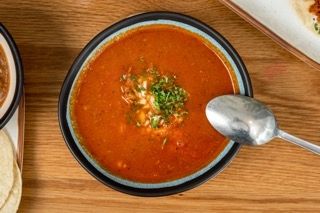Is Mexican Food Healthy? Unboxing the Nutritional Advantages of Conventional Components
The concern of whether Mexican food is healthy welcomes an expedition of its standard components. Beans and corn act as fundamental staples, abundant in healthy protein and fiber. Avocados offer helpful fats, while various herbs and flavors include taste and health benefits - lunch and dinner. With each other, these components produce a tapestry of nutrition. The healthfulness of Mexican cuisine frequently depends on prep work techniques and section dimensions. What duty do these factors play in identifying its total nutritional value?
The Power of Beans: Protein and Fiber-Rich Staples
Although usually forgotten, beans act as a cornerstone of Mexican food, providing a wide range of nutritional advantages. Rich in protein, they are an outstanding plant-based alternative for those looking for to meet their nutritional protein requires. This high healthy protein content supports muscular tissue repair and development, making beans invaluable for both vegetarians and meat-eaters alike. Additionally, beans are an extraordinary resource of dietary fiber, which assists in digestion and advertises a feeling of fullness, possibly aiding with weight monitoring.
The selection of beans used in Mexican dishes, such as black beans, pinto beans, and kidney beans, adds to a varied flavor profile and can improve dishes nutritionally. Beans are low in fat and contain crucial vitamins and minerals, including folate, magnesium, and iron. Together, these characteristics make beans an important component, delivering both nourishment and sustenance in traditional Mexican fare.

Corn: a Versatile Grain With Nutritional Advantages
Corn attracts attention as a flexible grain fundamental to Mexican food, commemorated not only for its cooking applications however additionally for its outstanding nutritional profile. As a main component in meals like tortillas, tamales, and pozole, corn supplies necessary nutrients that contribute to a well balanced diet regimen. Rich in carbohydrates, it offers as a significant energy source, while likewise being low in fat, making it a desirable option for different dietary demands.
In addition, corn is a good resource of nutritional fiber, which helps in digestion and advertises satiety. It includes considerable quantities of vitamins such as B-complex vitamins, which are vital for basal metabolism. The visibility of anti-oxidants, particularly carotenoids, adds to overall wellness by minimizing oxidative anxiety. Furthermore, corn is gluten-free, accommodating those with gluten level of sensitivities. Overall, the nutritional benefits of corn highlight its significance in typical Mexican food and its function in a healthy diet regimen.
Avocados: Healthy And Balanced Fats and Nutrients in Every Bite
Avocados play a significant role in Mexican cuisine, matching dishes with their creamy texture and abundant flavor. Past their cooking charm, avocados are celebrated for their impressive dietary profile. They are a rich resource of healthy and balanced monounsaturated fats, which can aid lower poor cholesterol degrees and assistance heart wellness. Additionally, avocados are packed with crucial minerals and vitamins, consisting of potassium, vitamin E, and B vitamins, contributing to total health.
The high fiber web content in avocados aids food digestion and promotes satiation, making them an advantageous enhancement to any type of meal. Their one-of-a-kind nutrient make-up can additionally support skin wellness and offer anti-inflammatory advantages. Incorporating avocados into traditional Mexican recipes or appreciating them as a standalone treat can improve both flavor and nutrition, showing why they are a precious staple in Mexican cuisine. Generally, avocados use a tasty means to enjoy healthy and balanced fats and crucial nutrients in every bite.

Seasonings and Herbs: Flavorful Wellness Boosters
While enjoying the rich flavors of Mexican cuisine, one can not neglect the vital function that spices and natural herbs play in enhancing both preference and health. Active ingredients such as cilantro, oregano, and chili peppers not only add to the dynamic flavor account but also supply considerable health benefits. Cilantro is recognized for its detoxifying residential or commercial properties, helping to get rid of heavy steels from the body, while oregano is packed with anti-oxidants and possesses anti-inflammatory results.
Chili peppers, a staple in several Mexican meals, contain capsaicin, which has been connected to boosted metabolism and pain alleviation. Additionally, seasonings like cumin and coriander support digestion and might help in blood glucose regulation. Incorporating these delicious wellness boosters into dishes not only enhances the cooking experience but likewise advertises overall wellness, making Mexican food not simply tasty, but additionally nutritionally advantageous.
Traditional Food Preparation Approaches: Enhancing Nourishment and Taste
Traditional cooking techniques in Mexican food play an essential role in boosting both nourishment and taste, as they typically focus on fresh active ingredients and time-honored methods. Strategies such as nixtamalization, where corn is saturated and prepared in an alkaline option, not just enhance the nutrient account of tortillas yet likewise improve their digestibility - take out and delivery. In addition, making use click here for info of slow cooking approaches, like stewing or braising, enables flavors to combine wonderfully while maintaining the integrity of the components

Regularly Asked Inquiries
Are Mexican Food Portions Normally Larger Than Various Other Foods?
Mexican food portions are commonly bigger than those of many other cuisines. This particular shows standard dining practices, stressing common sharing and hearty dishes, which can result in a more substantial serving size overall.
Just how Does the Prep Work Technique Affect Healthiness of Mexican Food?
Prep work methods significantly affect the healthfulness of Mexican food. Strategies such as cooking or steaming preserve nutrients, while frying can raise undesirable fat web content. Options of components and cooking styles eventually identify general nutritional worth.
Can Mexican Food Be Customized for Details Dietary Restrictions?
Mexican food can indeed be customized for specific city cafe dietary constraints. Substitutions, such as utilizing corn tortillas for gluten-free diet regimens or incorporating more veggies, allow people to appreciate conventional tastes while accommodating different nutritional needs.
What Are Common Mistaken Beliefs About Mexican Food and Health And Wellness?
Common false impressions concerning Mexican food include the belief that it is inherently unhealthy, excessively zesty, and exclusively concentrated on fats. In truth, typical recipes typically feature nutritious components and can be customized to numerous dietary requirements.
Exist Much Healthier Alternatives at Mexican Restaurants?
Much healthier options at Mexican restaurants commonly consist of grilled meats, beans, and fresh vegetables. Choosing recipes that stress whole ingredients and preventing heavy sauces can cause a much more nutritious eating experience, advertising total health.
The range of beans used in Mexican recipes, such as black beans, pinto beans, and kidney beans, adds to a varied taste profile and can enhance dishes nutritionally. Avocados play a substantial duty in Mexican cuisine, complementing meals with their creamy texture and abundant flavor. Incorporating avocados right into typical Mexican meals or appreciating them as a standalone snack can boost both taste and nutrition, demonstrating why they are a cherished staple in Mexican food. While enjoying the rich flavors of Mexican food, one can not neglect the vital role that spices and herbs play in enhancing both preference and health and wellness. Typical cooking techniques in Mexican cuisine play a crucial duty in boosting both nutrition and taste, as they typically focus on fresh active ingredients and time-honored methods.